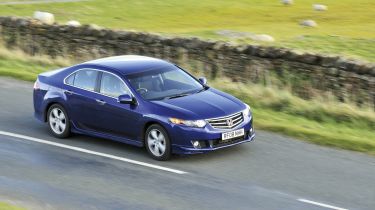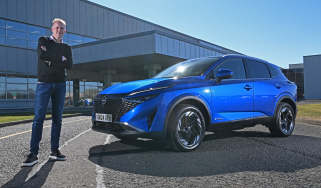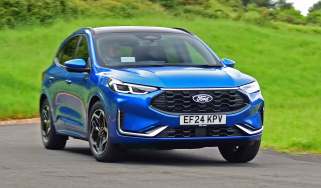Honda Accord 2.2 i-DTEC ES GT
Sporty four-door blends premium feel with value price tag
When Vauxhall was looking for an example of how to produce a family car with a difference, bosses may well have taken some inspiration from Honda’s Accord.
Unlike the Mondeo, the Japanese car doesn’t even attempt to offer huge carrying capacity. Instead, designers have focused on maximising desirability, with a view to attracting buyers of compact executive cars models from BMW, Audi and Mercedes.
There’s no doubt the Honda’s styling has plenty of appeal. The wedge shape and sharp lines are in stark contrast to both rivals. Its muscular stance leaves a greater impression than either the Vauxhall or Ford.
This angular design continues inside. While the Mondeo is all about practicality and the Insignia focuses on style, the Accord aims to offer the perfect cabin environment for the driver. That means a great seating position behind the wheel and large, clear dials. However, a scattergun approach to switchgear placement has resulted in a confusing array of buttons. Where the Accord package really starts to fall apart is in the rear. The seats are soft and well sculpted, but there’s simply not enough space.
Passengers have to put up with much less legroom than is provided by either the Vauxhall or Ford. At least the glass area is larger, giving children a better view out than they would have in the Insignia.
Used - available now

2023 Land Rover
Range Rover Evoque
21,259 milesAutomaticPetrol1.5L
Cash £33,000
2022 Kia
Niro
20,653 milesAutomaticPetrol1.6L
Cash £15,300
2020 Volkswagen
Tiguan
28,345 milesAutomaticPetrol2.0L
Cash £21,900
2021 Kia
Sportage
20,650 milesManualPetrol1.6L
Cash £15,400Without a five-door variant, Accord buyers have the choice of an estate or the saloon tested here. If you want serious carrying capacity, you’re going to need the former, because the four-door offers 467 litres, which is 61 litres behind the Mondeo.
Can the Honda make up for its significant versatility shortcomings out on the road? Even after only a few minutes behind the wheel, you will notice a greater degree of driver involvement than its rivals.
Honda has set up its front-wheel-drive family model not as a motorway cruiser, but more like an overgrown hot hatch. Lift off the accelerator mid-bend, and you will feel a more pronounced weight transfer from the rear to the front tyres than in any rival here, resulting in a more positive turn-in.
Add Honda’s smooth and punchy 2.2-litre diesel engine to the mix, and
the Accord is great fun to drive. The only downside of the engaging set-up is compromised long-distance cruising comfort. Compared to most members of the family car class, the Honda’s ability to smooth out motorway bumps is only adequate – the Insignia and Mondeo are much more supple, leaving you feeling fresher after long-distance journeys.
But there is one place where the Honda has its rivals beaten – the price list. Any preconceptions that the Japanese firm can’t match the value of mainstream rivals are false. The Accord is the cheapest model here, even if you add the £1,100 optional sat-nav to the £21,950 list price. Value and desirability don’t often come hand in hand, but both are standard in the Accord.
Details
Price: £21,950
Model tested: Honda Accord 2.2 i-DTEC ES GT
WHY: No other family car gets closer to compact executive rivals than the Accord.
Economy
For the private buyer, the Accord will be a very tempting proposition. Its £21,950 price tag is the lowest of our contenders, while residuals of 41.3 per cent mean you can expect to get back £9,065 after three years. Thanks to hi-tech engineering, the car’s 2.2-litre diesel is the cleanest and most economical motor here, emitting 150g/km of CO2 and returning 43.9mpg. You’ll pay a hefty £289 more than a Ford owner for three services, but at least the trips to the garage will be pleasant – the brand’s dealers finished sixth out of 30 in our annual Driver Power dealer survey.
Environment
The lowest official CO2 in this group is impressive, while the real-world economy of its hi-tech diesel powerplant also lived up to expectations.







